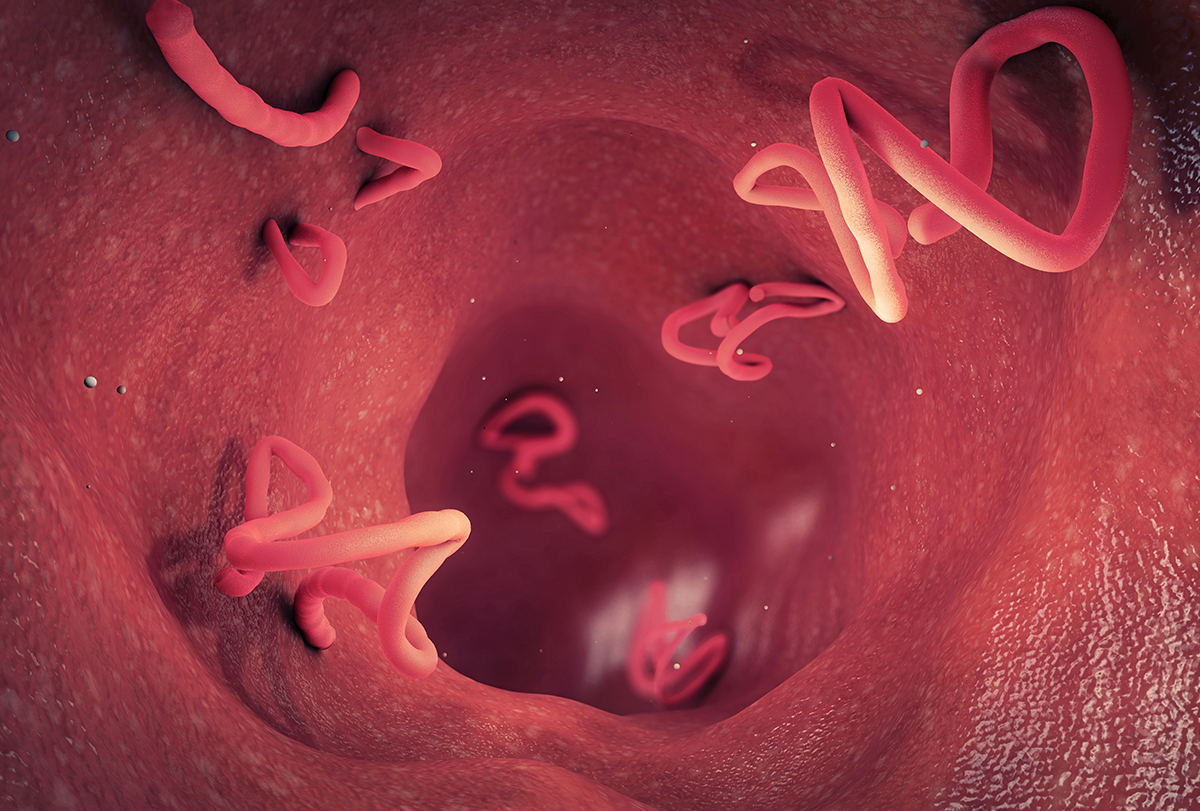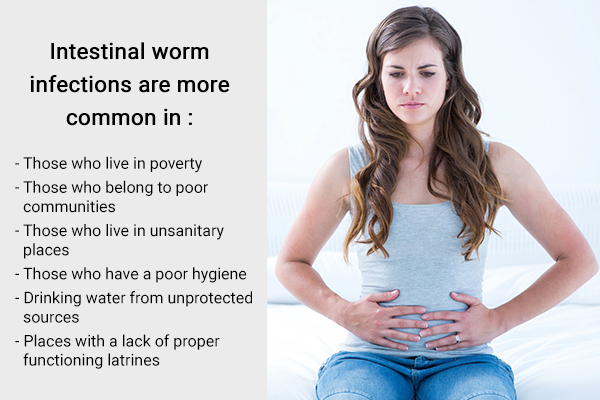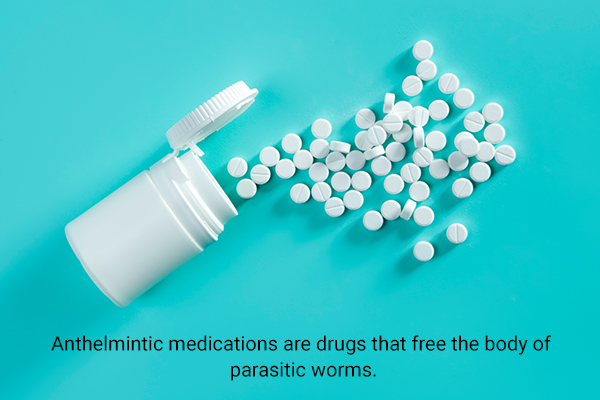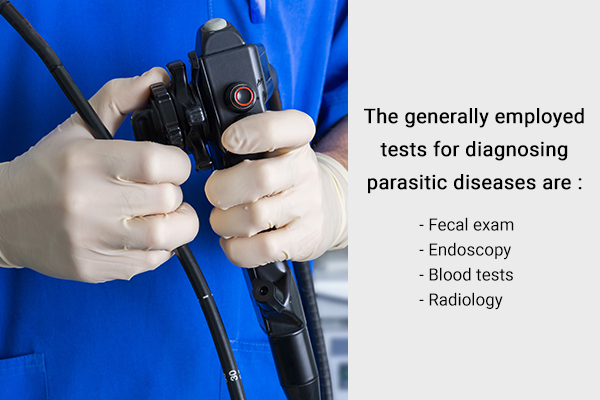In this article:
Intestinal worms are also referred to as soil-transmitted helminthiases. Intestinal worm infections are caused by various types of intestinal parasites that include:

- Roundworms
- Whipworms
- Hookworms
Roughly about 1.5 billion people are infected with soil-transmitted helminths (worms) around the world.
Intestinal worm infections are one of the most common infections globally and mainly affect poor societies. They are communicated from one place to another by eggs found in human feces. These eggs pollute the soil in nearby areas with poor sanitation.
Intestinal worms are a significant health concern because they hinder the capacity to absorb nutrients, hampering the growth and development of children. (1)
Burden of Intestinal Worms
Different types of parasites can cause infections in both developed and developing countries. Some examples include Enterobius vermicularis, Giardia intestinalis, and Cryptosporidium spp.
Amoebiasis caused by Entamoeba histolytica is a particularly common parasitic infection, affecting around 50 million people worldwide.
In India, like in other developing nations, intestinal parasitic infections are a major health concern, with infection rates ranging from 12.5% to 67%.
Also, protozoa and helminths are the two main types of parasites that can infect the human digestive system and lead to various clinical conditions, ranging from no symptoms to severe and life-threatening illnesses. (2)
Who Are at Increased Risks of Intestinal Worm Infections?

Intestinal worm infections are more common in people who: (3)
- Live in poverty
- Belong to poor communities
- Live in unsanitary places
- Have a poor hygiene
- Drink water from unprotected sources
- Are in places with a lack of proper functioning latrines
What Are the Symptoms of Intestinal Worm Infections?
Symptoms of intestinal worm infections include: (4)
- Loss of appetite
- Worms in stool
- Diarrhea
- Blood in stool
- Skin issues such as itching, swelling, and rashes
- Abdominal bloating
- Weight loss
- Vomiting
- Weakness
Medical Interventions Against Intestinal Worms
Given below are some treatment modalities to treat and manage intestinal worms.
Preventive chemotherapy for intestinal worms
Preventive chemotherapy is a strategy to prevent the spread of infectious diseases through the use of medication to treat and prevent the spread of parasites. WHO suggests regular therapeutic treatment, known as deworming, for the at-risk population residing in endemic areas without a prior individual diagnosis of intestinal worms. (3)
Deworming to prevent intestinal worms can be done through medication, such as albendazole or mebendazole, which can be prescribed by a healthcare provider and taken orally, usually as a single dose. It is recommended by experts to repeat the treatment every 6–12 months in areas with high prevalence of intestinal worms. (5)
So, in developing nations, communities at a greater risk for intestinal worm infections are frequently treated without a preliminary stool inspection. This intervention is termed preventive chemotherapy and is done to lessen morbidity by decreasing the burden of worm infections. (3)
The at-risk communities singled out by the World Health Organization are: (3)
- Preschoolers
- School-age children
- Women of childbearing age
- Pregnant women in the 2nd and 3rd trimesters
- Lactating women
- Adults in occupations with an increased risk of infections
Medicines available

Anthelmintic medications are drugs that free the body of parasitic worms. These include medicines such as albendazole and mebendazole which are considered to be the drugs of choice for the treatment of worm infections. (5)
Note: Consult a doctor before taking any medication.
How Are Intestinal Worms Transmitted?
Soil-transmitted helminths are transmitted by eggs found in the feces of those who are infected by them. Adult worms reside in the host’s intestine, where they deliver a lot of eggs every day.
In areas where there is improper sanitation, the eggs can pollute the soil by:
- Getting attached to crops or vegetables that are later consumed
- Getting mixed with water sources that people then drink
- Getting ingested accidentally by kids who play in contaminated soil
Also, hookworm eggs hatch in the soil themselves and develop into larvae, which after maturing can vigorously penetrate the skin. So, those who walk barefoot on contaminated soil can easily suffer from hookworm infection. (3)
How Are Intestinal Worms Diagnosed?
Here are some of the generally employed tests for diagnosing parasitic diseases.

1. Fecal exam
A fecal exam is also known as an ova and parasite test. It is done to discover parasites that may induce digestive issues such as diarrhea, watery stools, abdominal cramping, and flatulence.
The Centers for Disease Control and Prevention (CDC) advise that at least three stool samples should be collected on different days for examination.
This test examines the stool for eggs or parasites. Your doctor may advise you to put your stool sample in containers with a preservative. Samples without a preservative fluid can be stored in a refrigerator till required but shouldn’t be frozen. (6)
2. Endoscopy
An endoscopy or colonoscopy is done to discover parasites that cause gastrointestinal diseases. This is employed when the stool exam is not enough to uncover the cause of diarrhea.
For this test, a tube is put into the mouth or the rectum and the physician analyzes the intestine. (6)
3. Blood tests
A few parasitic infections can be caught by testing your blood sample. Blood tests examine your blood for a particular parasite infection and not for all parasitic infections.
The blood tests may include: (6)
- Serology – This test is employed to find antibodies or parasitic antigens secreted by the body when there’s an infection.
- Blood smear – This test is done to find parasites by examining a blood smear under a microscope.
4. Radiology
Radiological tests can be done to detect lesions in the organs in the case of some parasitic diseases. These tests include:
- X-ray
- Magnetic resonance imaging (MRI scan)
- Computerized axial tomography (CAT scan) (6)
What Are the Complications of Intestinal Worm Infections?
Infections by intestinal helminths can cause progressive deterioration of the body by causing anorexia (an eating disorder characterized by an intense fear of gaining weight and a distorted body image) and anemia.
If early treatment is not started, these infections are capable of causing fatalities in children. (4)
Sometimes, a group of worms called Ascaris lumbricoides can gather in the intestines of young children living in or near the tropics, causing a blockage in the gut. This can usually be treated without surgery, but trying to remove the worms with medication can actually make the blockage worse in some cases. (7)
When to See a Doctor
The home remedies proposed here are not an alternative to treatment by healthcare professionals. Therefore, it is thoroughly advised to see a doctor for an expert’s opinion if you fear you may be suffering from an intestinal worm infection.
Experts recommend that you consult a doctor positively on noticing the following:
- Persistent sickness, diarrhea, or stomach ache lasting more than two weeks
- A rash resembling a worm that is red and itchy on your skin
- Unexplained weight loss
- If you have recently traveled to an area where intestinal worms are prevalent.
Final Word
With the growing prevalence of worm infections, a new understanding of the prevention and control of parasitic infections is required.
Access to clean water, proper sanitation, and functioning washrooms for at-risk communities are crucial for the control of major worm infections.
 Continue Readinghttps://www.emedihealth.com/digestive-health/parasites/home-remedies-intestinal-worms
Continue Readinghttps://www.emedihealth.com/digestive-health/parasites/home-remedies-intestinal-worms
- Was this article helpful?
- YES, THANKS!NOT REALLY


